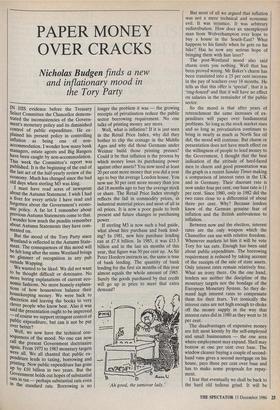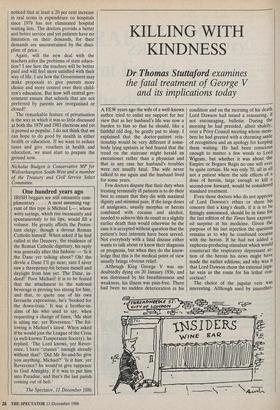PAPER MONEY OVER CRACKS
Nicholas Budgen finds a new
and inflationary mood in the Tory Party
IN HIS evidence before the Treasury Select Committee the Chancellor demons- trated the inconsistencies of the Govern- ment's monetary policy and its diminished Control of public expenditure. He ex- plained his present policy in controlling inflation as being one of non- accommodation. I wonder how many bank managers, estate agents and Big Bangers have been caught by non-accommodation. This week the Committee's report was published. It is the beginning of the end of the last act of the half-yearly review of the economy. Much has changed since the bad old days when sterling M3 was king. I must have read acres of newsprint about the Autumn Statement. I wish I had a fiver for every article I have read and forgotten about the Government's econo- mic policy. A fat lot I remember about previous Autumn Statements come to that. I wonder how much the pundits remember about Autumn Statements they have com- mented on.
But the mood of the Tory Party since Westland is reflected in the Autumn State- ment. The consequences of this mood will be felt long after the name Westland brings no glimmer of recognition in any pub outside Wapping. We wanted to be liked. We did not want to be thought difficult or dotrinaire. No more boring explanations of current eco- nomic fashions. No more homely explana- tions of how housewives balance their housekeeping money. We were back to discretion and leaving the books to very clever people who know best. Also it was said the presentation ought to be improved — of course we support stringent control of public expenditure, but can it not be put over better?
Well, we now have the technical con- sequences of the mood. No one can now call the present Government doctrinaire again. From 1975 to 1983 monetary targets were all. We all chanted that public ex- penditure leads to taxing, borrowing and Printing. Now public expenditure has gone UP by £10 billion in two years. But the Government holds out hopes of substantial cuts in tax — perhaps substantial cuts even in the standard rate. Borrowing is no longer the problem it was — the growing receipts of privatisation reduce the public sector borrowing requirement. No one talks of printing money any more.
Well, what is inflation? If it is just seen in the Retail Price Index, why did they bother to clip the coinage in the Middle Ages and why did those Germans under Weimar build those printing presses? Could it be that inflation is the process by which money loses its purchasing power against other assets? You now need at least 20 per cent more money that you did a year ago to buy the average London house. You now use 30 per cent more money than you did 18 months ago to buy the average stock or share. The Retail Price Index strongly reflects the fall in commodity prices, in industrial material prices and most of all in oil prices. It is now a poor guide to both present and future changes in purchasing power.
If sterling M3 is now such a bad guide, what about hire purchase and bank lend- ing? In 1981, new hire purchase lending ran at £7.8 billion. In 1985, it was £13.5 billion and in the last six months of this year, that figure was 50 per cent up. As Sir Peter Hordern instructs us, the same is true of bank lending. The quantity of bank lending for the first six months of this year almost equals the whole amount of 1985. Surely the goods purchased by that credit will go up in price to meet that extra demand?
Ah good, the samovar lady.'
But most of all we argued that inflation was not a mere technical and economic evil. It was injustice. It was arbitrary redistribution. How does an unemployed man from Wolverhampton ever hope to buy a house in the South-East? What happens to his family when he gets on his bike? Has he now any serious hope of bringing them with him later?
The post-Westland mood also said charm costs you nothing. Well that has been proved wrong. Mr Baker's charm has been translated into a 25 per cent increase in the pay of teachers over 18 months. He tells us that this offer is 'special', that it is `ring-fenced' and that it will have no effect on salaries in the remainder of the public sector.
So the mood is that after years of retrenchment the same increases of ex- penditure will paper over fundamental problems. So long as the stock market rises and so long as privatisation continues to bring in nearly as much as North Sea oil did, the mood will continue. But charm or presentation does not have much effect on the willingness of people to lend money to the Government. I thought that the best indication of the attitude of hard-faced men to charm and good presentation was the graph in a recent Sunday Times making a comparison of interest rates in the UK and in Germany. Their discount rate is now under four per cent, our base rate is 11 per cent. Since 1980, only in 1982 did the two rates close to a differential of about three per cent. Why? Because lenders knew of the German genuine fear of inflation and the British ambivalence to inflation.
Between now and the election, interest rates are the only weapon which the Chancellor can use with relative freedom. Whenever markets let him it will be vote Tory for tax cuts. Enough has been said about public expenditure. The borrowing requirement is reduced by taking account of the receipts of the sale of state assets. Only interest rates remain relatively free. What an irony there. On the one hand, lenders see neither the discipline of the monetary targets nor the bondage of the European Monetary System. So they de- mand high interest rates to compensate them for their fears, Yet ironically the interest rates are not high enough to choke off the money supply in the way that interest rates did in 1980 as they went to 16 per cent.
The disadvantages of expensive money are felt most keenly by the self-employed and small businessmen — the one area where employment may expand. Shell may borrow at one per cent over base. The window cleaner buying a couple of second- hand vans gives a second mortgage on his house, pays three per cent over base and has to make some proposals for repay- ment.
I fear that eventually we shall be back to the hard old tedious grind. It will be noticed that at least a 20 per cent increase in real terms in expenditure on hospitals since 1979 has not eliminated hospital waiting lists. The doctors provide a better and better service and yet patients have no limitation on their demands, for their demands are unconstrained by the disci- pline of price.
Again, will the new deal with the teachers solve the problems of state educa- tion? I see how the teachers will be better paid and will feel more satisfied with their way of life. I see how the Government may make proposals to give parents more choice and more control over their child- ren's education. But how will central gov- ernment ensure that schools that are not preferred by parents are reorganised or closed?
The remarkable feature of privatisation is the way in which it was so little discussed at both the 1979 and 1983 elections and yet it proved so popular. I do not think that we can hope to do good by stealth in either health or education. If we want to reduce taxes and give vouchers in health and education, we must start to prepare the ground now.
Nicholas Budgen is Conservative MP for Wolverhampton South-West and a member of the Treasury and Civil Service Select Committee.



































































 Previous page
Previous page